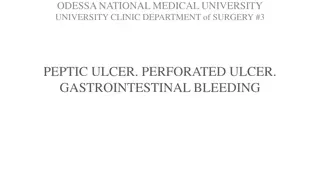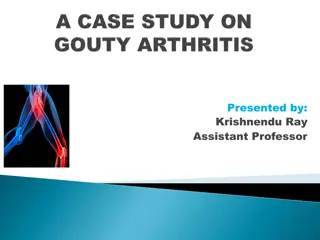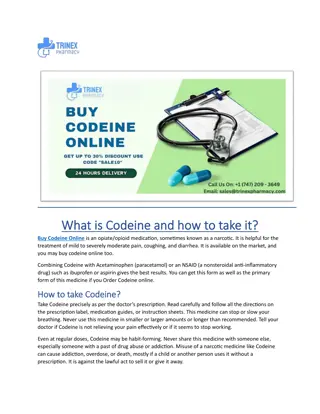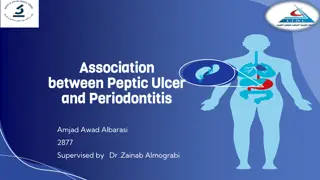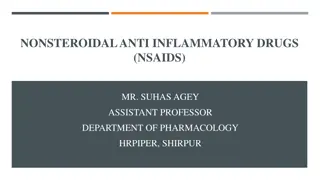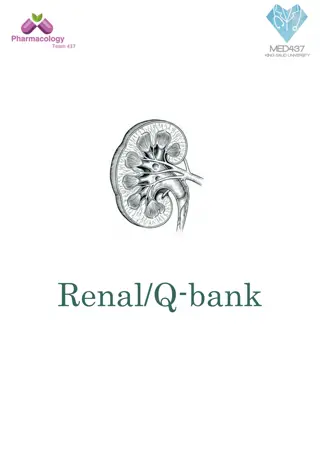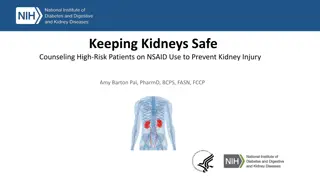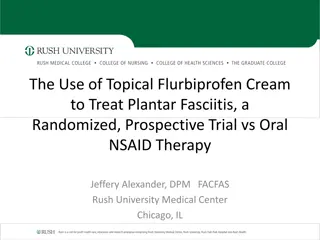Understanding Peptic Ulcer Disease: Causes, Symptoms, and Treatment
Peptic ulcer disease (PUD) involves ulcerations in the duodenal or gastric mucosa caused by factors like Helicobacter pylori infection and NSAID use. Symptoms include abdominal pain and nausea, and treatment often involves H. pylori eradication and proton pump inhibitors to prevent complications lik
1 views • 77 slides
Case Study: Diagnosis and Management of Gouty Arthritis in a Middle-Aged Male
A 33-year-old male with fever, chills, joint pain, and inflammation in knees was diagnosed with Gouty Arthritis. Detailed medical history, vitals, test results, and treatment with specific drugs like Tramadol, Diclofenac, and Febuxostat were provided. Assessment revealed elevated uric acid levels, a
0 views • 20 slides
What is Codeine and how to take it ???
Buy Codeine Online is an opiate\/opioid medication, sometimes known as a narcotic. It is helpful for the treatment of mild to severely moderate pain, coughing, and diarrhea. It is available on the market, and you may buy codeine online too. Combining Codeine with Acetaminophen (paracetamol) or an NS
1 views • 4 slides
Association Between Peptic Ulcer and Periodontitis: Insights and Connections
Previous studies have suggested a potential link between peptic ulcer disease (PUD) and periodontitis. PUD affects the gastrointestinal mucosa, with key risk factors being H. pylori infection and NSAID use, while periodontitis is an inflammatory disease affecting the tissues around teeth. Understand
0 views • 17 slides
Understanding Nonsteroidal Anti-Inflammatory Drugs (NSAIDs) and Their Pharmacology
Nonsteroidal anti-inflammatory drugs (NSAIDs) are a class of analgesic, antipyretic, and anti-inflammatory medications that work by inhibiting prostaglandin synthesis. They provide relief from pain, reduce fever, and combat inflammation through various mechanisms. Aspirin, a commonly used NSAID, irr
0 views • 21 slides
Renal Pharmacology: Drug Excretion and Renal Clearance Questions
This comprehensive set of questions and answers covers topics related to drug excretion and renal pharmacology. It includes information on glomerular filtration, drug excretion mechanisms, dosage adjustments in renal impairment, factors influencing drug excretion, and the effects of long-term NSAID
0 views • 55 slides
Preventing Kidney Injury: Counseling High-Risk Patients on NSAID Use
Understand the impact of drugs on kidney function, identify patients at risk for acute kidney injury (AKI), and learn key opportunities for pharmacists to educate and prevent NSAID-induced AKI. AKI is common and preventable, particularly among elderly patients and those with diabetes, hypertension,
0 views • 29 slides
Understanding Peptic Ulcer Disease and Dyspepsia: Causes and Pathogenesis
Peptic ulcer disease and dyspepsia are common gastrointestinal conditions. Dyspepsia presents with upper abdominal pain and may or may not be associated with peptic ulcers. The most prevalent causes of dyspepsia include non-ulcer dyspepsia, GERD, and peptic ulcers. Peptic ulcers account for a signif
0 views • 24 slides
Understanding Peptic Ulcers: Causes, Symptoms, and Treatment
Peptic ulcers are open sores that form in the stomach or upper small intestine, leading to symptoms like stomach pain, bloating, and nausea. Common causes include H. pylori infection and NSAID use. Recognizing symptoms, such as burning stomach pain, is crucial for timely diagnosis and management. Se
0 views • 19 slides
Topical Flurbiprofen Cream vs. Oral NSAID Therapy for Plantar Fasciitis Treatment: A Comparative Study
Plantar fasciitis is a common cause of heel pain affecting a significant portion of the population. This study compares the effectiveness of topical flurbiprofen cream and oral NSAID therapy in treating plantar fasciitis. The condition is characterized by inflammation and pain in the plantar fascia,
0 views • 28 slides
NSAID Use in Chicken Pox: Pediatric Considerations and Implications
This study delves into the debate surrounding administering NSAIDs like ibuprofen to children with chicken pox. It addresses the possible risks associated with NSAID use in varicella infections, focusing on the potential worsening of skin infections due to inhibited neutrophil function. The PICO ana
0 views • 17 slides
